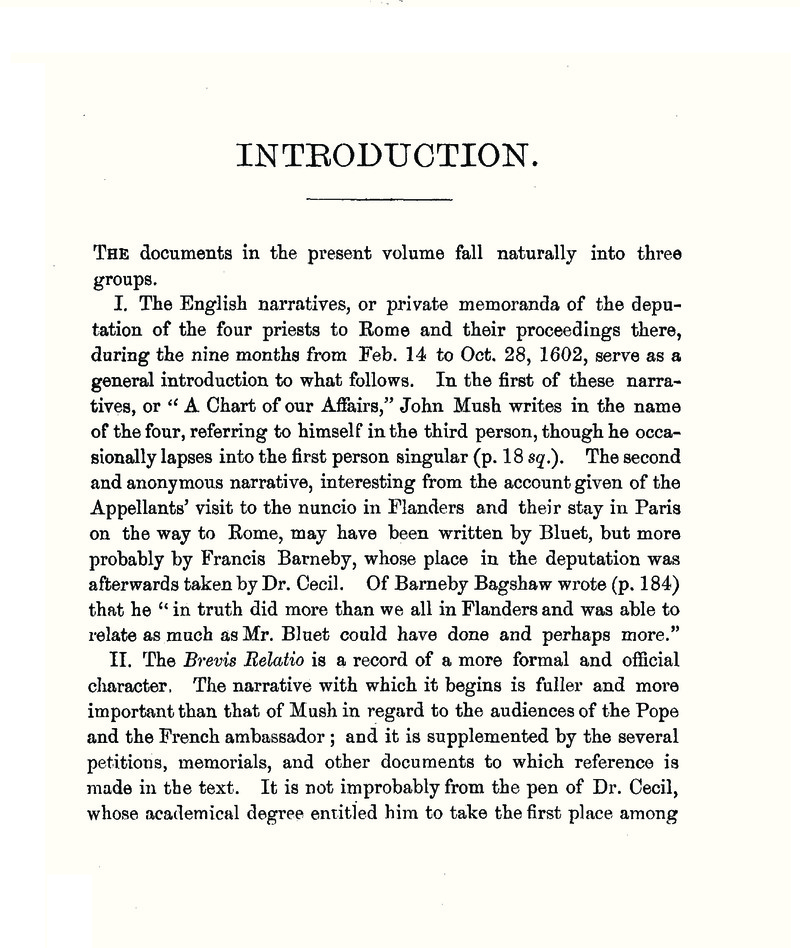No CrossRef data available.
Article contents
Introduction
Published online by Cambridge University Press: 24 December 2009
Abstract

- Type
- Introduction
- Information
- Copyright
- Copyright © Royal Historical Society 1898
References
Page x note a This French hand appears once more in the endorsement of a separate document, the questions submitted to M. Seraphin (p. 209).
Page xi note a In the Introduction to vol. i. (p. xxi), I stated that they began their journey about the end of September. They were at least reported on the 16th as ready to start immediately (Tierney, iii. p. cxlviii). It appears, however, from the Second Narrative (infra, p. 29) that they did not leave London for Dover until about Nov. 4.
Page xii note a Printed in English, Cal. S. P., Dom. Eliz. cclxxxiii. 70, and in the original Latin in Jesuits and Seculars, p. 153.
Page xv note a See an article in the Edinburgh Review of April 1898, entitled “English Jesuits and Scottish Intrigues, 1581–2.”
Page xv note b A copy of which he presented to the Infanta in June 1601.
Page xvii note a These words of Cajetan are as emphatically quoted, with Colletotl's comment upon them, in Jesuits and Seculars (p. lxiii).
Page xviii note a Blackwell's own rendering of the clause in his summary of letters and briefs submitted to the Government in 1607 was, “that the Archpriest in causes of greater importance should use the advice of the Superior of the Jesuits because he was a man of great experience in the affairs of England.”
Page xviii note b Beliefs, fears, and suspicions, most potent factors in the history of any party, cannot be ignored as non-existent or as mere pretences because in the opinion of a oritio three centuries later these beliefs and fears were not justified by the circumstances. Nor, in the case of the Appellants, can their motives be fairly judged without reading their own books.
Page xix note a These fifteen were —
1. H. Garnet, alias Whalley, Darcy, Farmer, etc.
2. E. Western, alias Edmunds.
3. R. Holtby, alias Ducket, Fetherston, etc.
4. T. Lister, alias Butler.
5. E. Jones, alias Holland, Draper, Northe.
6. J. Bennet, alias Price, Flood, Baker.
7. J. Gerard, alias Standish, Brook, Lee, etc.
8. E. Oldoorne, alias Hall, Hutton, Parker.
9. T. Stanney, alias Pinke.
10. E. Couling, alias Coljin of whom little is known.
11. B. Collins of whom little is known.
12. E. Walpole, alias Pauper.
13. J. Percy, alias Fisher, Fairfax.
14. E. Banks, alias Stanhope.
15. E. Blunt, alias Mann, Udall, Eandall, Basset, Mildmay, etc.
Page xix note a Blackwell wrote to the Cardinal Protector, Jan. 10, 1597 : “So far are these holy fathers estranged from all appetite of seeking to bear rule, as in every place they prefashion unto us an example of rare humility, mildness, patience, piety, and charity” (Colleton's translation). The whole letter is printed in Jesuits and Seculars, p. 137.
Page xxiv note a This was indeed the case. The few English Fathers, backed by the resources of a powerful Society, with extraordinary energy and daring, and with the command of the purses of rich laymen, had supported and built up the mission on the foundations laid by Allen. They were making themselves well-nigh indispensable. They held a number of the clergy in the hollow of their hands. It was an abnormal state of things. Reaction and revolt, even apart from the political quarrel, were inevitable. The Jesuits were naturally tenacious of their hardly-won position and power, and the seculars as naturally tenacious of their liberty and independence.
Page xxv note a Tierney, iii. clxxxii., quoting from the Gradwell MSS.


